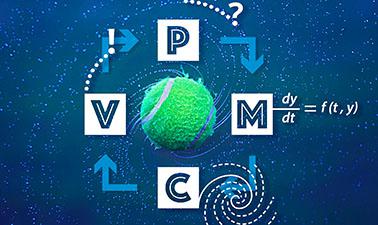
Description
After completing this course, learners will be able to:
• Represent data as vectors and matrices and identify their properties using concepts of singularity, rank, and linear independence, etc.
• Apply common vector and matrix algebra operations like dot product, inverse, and determinants
• Express certain types of matrix operations as linear transformations
• Apply concepts of eigenvalues and eigenvectors to machine learning problems
Mathematics for Machine Learning and Data science is a foundational online program created in by DeepLearning.AI and taught by Luis Serrano. This beginner-friendly program is where you’ll master the fundamental mathematics toolkit of machine learning.
Many machine learning engineers and data scientists need help with mathematics, and even experienced practitioners can feel held back by a lack of math skills. This Specialization uses innovative pedagogy in mathematics to help you learn quickly and intuitively, with courses that use easy-to-follow plugins and visualizations to help you see how the math behind machine learning actually works.
Upon completion, you’ll understand the mathematics behind all the most common algorithms and data analysis techniques — plus the know-how to incorporate them into your machine learning career.
This is a beginner-friendly program, with a recommended background of at least high school mathematics. We also recommend a basic familiarity with Python, as labs use Python and Jupyter Notebooks to demonstrate learning objectives in the environment where they’re most applicable to machine learning and data science. If you are already familiar with the concepts of linear algebra, Course 1 will provide a good review, or you can choose to take Course 2 of this specialization, Calculus for Machine Learning and Data Science now, and Course 3, Probability and Statistics for Machine Learning and Data Science when it is released in April.
Tags
Syllabus
- Week 1: Systems of linear equations
- Matrices are commonly used in machine learning and data science to represent data and its transformations. In this week, you will learn how matrices naturally arise from systems of equations and how certain matrix properties can be thought in terms of operations on system of equations.
- Week 2: Solving systems of linear equations
- In this week, you will learn how to solve a system of linear equations using the elimination method and the row echelon form. You will also learn about an important property of a matrix: the rank. The concept of the rank of a matrix is useful in computer vision for compressing images.
- Week 3: Vectors and Linear Transformations
- An individual instance (observation) of data is typically represented as a vector in machine learning. In this week, you will learn about properties and operations of vectors. You will also learn about linear transformations, matrix inverse, and one of the most important operations on matrices: the matrix multiplication. You will see how matrix multiplication naturally arises from composition of linear transformations. Finally, you will learn how to apply some of the properties of matrices and vectors that you have learned so far to neural networks.
- Week 4: Determinants and Eigenvectors
- In this final week, you will take a deeper look at determinants. You will learn how determinants can be geometrically interpreted as an area and how to calculate determinant of product and inverse of matrices. We conclude this course with eigenvalues and eigenvectors. Eigenvectors are used in dimensionality reduction in machine learning. You will see how eigenvectors naturally follow from the concept of eigenbases.

Linear Algebra for Machine Learning and Data Science
-
TypeOnline Courses
-
ProviderCoursera
• Represent data as vectors and matrices and identify their properties using concepts of singularity, rank, and linear independence, etc.
• Apply common vector and matrix algebra operations like dot product, inverse, and determinants
• Express certain types of matrix operations as linear transformations
• Apply concepts of eigenvalues and eigenvectors to machine learning problems
Mathematics for Machine Learning and Data science is a foundational online program created in by DeepLearning.AI and taught by Luis Serrano. This beginner-friendly program is where you’ll master the fundamental mathematics toolkit of machine learning.
Many machine learning engineers and data scientists need help with mathematics, and even experienced practitioners can feel held back by a lack of math skills. This Specialization uses innovative pedagogy in mathematics to help you learn quickly and intuitively, with courses that use easy-to-follow plugins and visualizations to help you see how the math behind machine learning actually works.
Upon completion, you’ll understand the mathematics behind all the most common algorithms and data analysis techniques — plus the know-how to incorporate them into your machine learning career.
This is a beginner-friendly program, with a recommended background of at least high school mathematics. We also recommend a basic familiarity with Python, as labs use Python and Jupyter Notebooks to demonstrate learning objectives in the environment where they’re most applicable to machine learning and data science. If you are already familiar with the concepts of linear algebra, Course 1 will provide a good review, or you can choose to take Course 2 of this specialization, Calculus for Machine Learning and Data Science now, and Course 3, Probability and Statistics for Machine Learning and Data Science when it is released in April.
- Week 1: Systems of linear equations
- Matrices are commonly used in machine learning and data science to represent data and its transformations. In this week, you will learn how matrices naturally arise from systems of equations and how certain matrix properties can be thought in terms of operations on system of equations.
- Week 2: Solving systems of linear equations
- In this week, you will learn how to solve a system of linear equations using the elimination method and the row echelon form. You will also learn about an important property of a matrix: the rank. The concept of the rank of a matrix is useful in computer vision for compressing images.
- Week 3: Vectors and Linear Transformations
- An individual instance (observation) of data is typically represented as a vector in machine learning. In this week, you will learn about properties and operations of vectors. You will also learn about linear transformations, matrix inverse, and one of the most important operations on matrices: the matrix multiplication. You will see how matrix multiplication naturally arises from composition of linear transformations. Finally, you will learn how to apply some of the properties of matrices and vectors that you have learned so far to neural networks.
- Week 4: Determinants and Eigenvectors
- In this final week, you will take a deeper look at determinants. You will learn how determinants can be geometrically interpreted as an area and how to calculate determinant of product and inverse of matrices. We conclude this course with eigenvalues and eigenvectors. Eigenvectors are used in dimensionality reduction in machine learning. You will see how eigenvectors naturally follow from the concept of eigenbases.
Related Courses


Metodi quantitativi - Modulo statistica

Regression and Classification

Математика для всех

External Debt Statistics

Multilevel Modeling

Modelling with Differential Equations

Differential Equations I

Multiple Linear Regression

NDA Exam Preparation & Study Guide

Statistics in Education for Mere Mortals


 Online Courses
Online Courses  Coursera
Coursera
